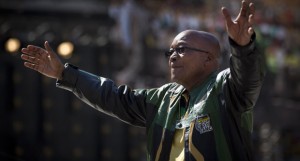JOHANNESBURG – South Africa’s president said Monday that criminals broke into his rural homestead more than a decade ago and raped his wife, as he sought to explain a $23 million taxpayer-funded security upgrade ahead of elections.
Jacob Zuma said the culprits were “arrested, charged, convicted,” recounting a previously unpublicized event at his Nkandla homestead in KwaZulu-Natal before he took over as president in 2009.
Zuma did not say which of the four wives he had at the time was the victim. One has since committed suicide and he has divorced the African Union chairperson Nkosazana Dlamini-Zuma.
Zuma has come under fierce criticism over the spending ahead of Wednesday’s election. He is expected to win a second five-year term despite the scandal.
A public watchdog in March found the president had unduly benefited from the renovations, which included a swimming pool, helipad and private clinic, and ordered him to pay back part of the costs.
“Why should I be charged for it if some people inflated prices?” he hit back on Monday.
He said that the issue had been stirred up by the media and by opposition parties.
“People don’t think the Nkandla is an issue to affect ANC voters,” he said.
A recent snap poll by research firm Pondering Panda showed more than two thirds of young South Africans believe Zuma should resign over the Nkandla scandal.
But the ANC’s anti-apartheid past is likely to be enough to give the party another election landslide.
“We think the ANC will win the elections overwhelmingly, not just, you know, by the skin of its teeth,” Zuma told a news conference two days before the May 7 vote.
High joblessness and poverty levels, as well as a succession of government corruption scandals, are unlikely to reduce support for the ruling African National Congress, which has won each of the four elections since apartheid ended in 1994.
Zuma emphasized South Africa’s progress since the end of white minority rule, especially compared to its African peers.
“All the countries who got independence — not a single one has been able to deliver in the way that we have delivered,” he said, though he acknowledged problems in delivering basic services especially to poor and rural communities.
Many problems were the legacy of apartheid, which had left certain areas underdeveloped and deprived black South Africans of education, he said.
The ANC is expected to garner 63 percent in Wednesday’s vote, according to the latest Ipsos poll, just three points less than in 2009.
But many people are expected to stay away from the ballots, disillusioned with the ruling party but at a loss for a viable political alternative.
The party wrapped up its election campaign in Soweto township on Sunday. Around 90,000 people gathered for a rally at the same stadium that hosted the 2010 football World Cup Final, though many left during the president’s speech.
